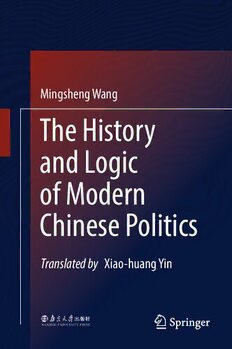
The History and Logic of Modern Chinese Politics PDF
Preview The History and Logic of Modern Chinese Politics
Mingsheng Wang The History and Logic of Modern Chinese Politics Translated by Xiao-huang Yin The History and Logic of Modern Chinese Politics Mingsheng Wang The History and Logic of Modern Chinese Politics MingshengWang SchoolofGovernment NanjingUniversity Nanjing,China Translatedby Xiao-huangYin SchoolofForeignStudies NorthwesternPolytechnicUniversity Xi’an,China ISBN978-981-16-3715-5 ISBN978-981-16-3716-2 (eBook) https://doi.org/10.1007/978-981-16-3716-2 JointlypublishedwithNanjingUniversityPress TheprinteditionisnotforsaleinChina(Mainland).CustomersfromChina(Mainland)pleaseorderthe printbookfrom:NanjingUniversityPress. ISBNoftheCo-Publisher’sedition:978-730-50-9226-8 TranslationfromtheChineselanguageedition:当代中国政治发展的历史与逻辑byMingshengWang, andXiao-huangYin,©NanjingUniversityPress2014.PublishedbyNanjingUniversityPress.AllRights Reserved. ©NanjingUniversityPress2021 Thisworkissubjecttocopyright.AllrightsaresolelyandexclusivelylicensedbythePublisher,whether thewholeorpartofthematerialisconcerned,specificallytherightsoftranslation,reprinting,reuse ofillustrations,recitation,broadcasting,reproductiononmicrofilmsorinanyotherphysicalway,and transmissionorinformationstorageandretrieval,electronicadaptation,computersoftware,orbysimilar ordissimilarmethodologynowknownorhereafterdeveloped. Theuseofgeneraldescriptivenames,registerednames,trademarks,servicemarks,etc.inthispublication doesnotimply,evenintheabsenceofaspecificstatement,thatsuchnamesareexemptfromtherelevant protectivelawsandregulationsandthereforefreeforgeneraluse. Thepublishers,theauthors,andtheeditorsaresafetoassumethattheadviceandinformationinthisbook arebelievedtobetrueandaccurateatthedateofpublication.Neitherthepublishersnortheauthorsor theeditorsgiveawarranty,expressorimplied,withrespecttothematerialcontainedhereinorforany errorsoromissionsthatmayhavebeenmade.Thepublishersremainneutralwithregardtojurisdictional claimsinpublishedmapsandinstitutionalaffiliations. ThisSpringerimprintispublishedbytheregisteredcompanySpringerNatureSingaporePteLtd. The registered company address is: 152 Beach Road, #21-01/04 Gateway East, Singapore 189721, Singapore Preface and Acknowledgments (Translator) This anthology of 33 carefully selected essays written by Dr. Mingsheng Wang, a renowned Chinese political scientist, is a groundbreaking and thought-provoking studyofthesociopoliticalforcesbehindChina’sgradualemergenceasanewglobal power in the twentieth century and its rapid rise as the world’s second-largest economyoverthepast40years.Theauthor’sargument,illuminatedbycomparative theoreticalanalysesandbasedonmeticulouslydetailedempiricalresearch,provides readerswithafreshandperceptiveanalysisofpatternsofChina’smodernpolitical development and functions as a lens through which readers can better understand China’s remarkable accomplishment as well as broader issues that have perplexed many:IsthereaChinaPathtosociopoliticalprogress?Whatisthe“socialismwith Chinese characteristics”? Can China redefine its niche and maintain its growing momentum in a multilateral world? And finally, what lessons can we draw from China’scontinuingprogressasapost-developmentalnationinthepost-COVIDera? Astheauthorargueseloquentlyandwithpersuasiveevidence,China’songoing progresshasfollowedneitherthemodeofRussian-stylesocialismnorthatofWestern prototypical capitalism. Rather, it represents a distinctively different model of progressandcontinuoussearchforaviablealternativeroutetomodernity,unfolding throughaprocessgroundedinandimbuedwithChinesecharacteristicsandChinese realities.Byidentifyingsuchanalternativesystemasthe“ChinaPath,”theauthor demonstratesconvincinglythatthereexistampleoptionsfordifferenttypesofmoder- nity that transcend the dichotomy of state-run and market-driven models, and that economic development means not only industrialization but also the progress of political democratization and the realization of the rule of law. In this sense, this book provides a much-needed opportunity for scholars and policymakers as well asanyonewhowantstogetaninsider’sviewofthehistory,logic,andprospectof China’ssociopoliticaldevelopmentandreachnuancedanalysesofcriticalissuesin theEnglishlanguagediscourseonChinastudies. There is no need to further elaborate the profound implications of Dr. Wang’s trulyoriginalstudy,whichhassignificantlyenrichedourunderstandingofmodern China.AstheprincipaltranslatorandeditoroftheEnglishversionoftheanthology, however, I would like to take this opportunity to express my appreciation to all v vi PrefaceandAcknowledgments(Translator) the individuals and institutions that have dedicated their time or resources to the successfulpublicationofthebook.Firstandforemost,Iwanttothankmyfriends, colleagues, and students who have generously contributed their expertise to the completionofthissignificantyetchallengingproject.Translatorsofvariousdrafts of the essays contained in the anthology include Professors Liu Jie (Chaps. 6–9), Lv Fang (Introduction and Chaps. 22 and 27), Ren Jiong (Chaps. 15, 18 and 28), Rui Xue (Chap. 21), Su Xiaoqing (Chaps. 30–33), Wang Qian (Chaps. 4 and 10), WangXiaodan(Chaps.16and17),XueHongguo(Chaps.24and25),YangHuiying (Chaps.3and5),YuanYan(Chaps.20and29),ZhouShuang(Chaps.14,19and26), andZuoLiankai(Chaps.11–13).ProfessorsPaulJay,PeterKoehn,DavidPrestel, Adrienne Tien, James Tranquada, and Xu Lei as well as Henry Moore Allen and JoshuaLeungTsangcontributedvaluableskillandtimebyproofreadingorreviewing differentpartsofthedrafts.IamalsodeeplygratefultoProf.ZhangYi,whoplayedan invaluableroleinservicingasanorganizeroftheproject.Myspecialgratitudegoes out to Prof. Wang Xiaodan, who not only translated two chapters, but also helped mesoefficiently,painstakingly,andpatientlypreparethedraftsofthefinalversion ofthemanuscriptundertimepressure.Dr.LiYali,Dr.WangWei,Mr.CuiXiaobin, andDr.WangXuanalsoprovidedassistanceineditingthemanuscriptinoneway oranother.TheHumanitiesFundsofNorthwesternPolytechnicUniversityandthe Faculty Enrichment Grant of Occidental College generously provided support for thistranslationproject. Despite my best efforts, errors and inconsistencies undoubtedly remain in the Englishtranslation.Itakefullresponsibility,butIhopethattheyarefewandthey will not detract from this vitally important and timely study of modern Chinese politicsintoday’sincreasinglyglobalizedandcomplexworld. Xi’an/Nanjing,China Xiao-huangYin February2021 DeanoftheSchoolofForeignStudiesat NorthwesternPolytechnicUniversity,China ChangjiangScholarChairProfessorofthe ChineseEducationMinistry ProfessorofAsian/AmericanStudiesat OccidentalCollege,LosAngeles,USA Introduction Politicaldevelopmentmeansnotonlytheprogressofpoliticaldemocratization,but alsotheemergenceofanindependentnationstate. Atthedawnofthetwentiethcentury,China’spoliticaldevelopmentenduredsevere hardship.Chinathenwasbulliedbycolonialandimperialistpowers,anditsuffered fromrecurrentunrest,autocracy,andfeudalsuperstition.Consequently,itspolitical developmenthadtofulfillthedualmissionsofbothsurvivinginthatcomplexand difficulteraandenlighteningthemassesofthepeople.Asaresult,China’spolitical environmentwascomplicatedandeverchanging;thesocialecologywasintricate; andgoodandbadculturaltraditionswereintermingled.Therefore,China’spolitical developmentnotonlycontainednationalcharacteristics,butalsorestrictedthegrowth offreedom,democracy,andscience. Whensurvivalisthemajorthemeofthetimes,theenlightenmentcryof“democ- racy” and “science” becomes the symbol of the times. Illuminated by all kinds of social thought flooding in China and influenced by their viewpoints and political ideals,peoplefromallsocialsegmentsbegantodevotethemselvestothecauseof spreading truth and knowledge and taking political action, thereby beginning the magnificentdramaofChina’spoliticaldevelopment.Theleadingrolesofthisdrama thuschangedwiththetimes. Politicaldevelopmentiscloselyrelatedtoculturaltraditions.Everynationhasits ownculturaltraditionsandhistoricallegacies.Intheprocessofpoliticaldevelopment, these cultural traditions and historical legacies will mix with each other to shape different aspects of sociopolitical development, such as citizens’ enthusiasm for politicalparticipation,obediencetolegalauthority,awarenessofabidingbythelaw, recognition of the spirit of democracy, and respect for and tolerance of different opinions. Politicaldevelopmentisalsoinfluencedandconditionedbythegoals,norms,and valuesofpoliticalorganizationsandauthorities.Theywillleadpoliticaldevelopment indifferentdirections. Followingtheaforementioneddiscussion,IhaveanalyzedthepatternsofChina’s politicaldevelopmentfromtheperspectiveofitshistoricalbackgroundsandcultural vii viii Introduction traditions under the framework of the history of China’s revolution and socialist construction. SelectedfrommywritingsonpoliticaldevelopmentincontemporaryChina,this anthologyiscomposedofthefollowingfiveparts: PartI.EmergingTrendsofSocialThoughtandPoliticalDevelopmentinChina. China’smodernandcurrentpoliticaldevelopmentisaffectedbytrendsofsociopo- liticalthoughtathomeandfromabroad.PartIanalyzesConfucianethicsofgover- nance,trendsofsocialthoughtdomesticallyandinternationally,theSinicizationof Marxism, and the conflicts among these trends of thought. It intends to trace the ideological origins of China’s political development and the political demands of differentschoolsofthought. PartII.RevolutionaryBaseAreasandPoliticalDevelopmentinChina.Revolu- tionarybaseareaswerethefirstplacesunderthegovernanceoftheCommunistParty ofChina(CPC).Thepoliticalandeconomicconstructionoftherevolutionarybase areasandtheirculturalheritagehavemadeaprofoundinfluenceonChina’spolitical development.Initsearlyyearsofgovernance,theCPC’stransformationfromarevo- lutionarypartytoarulingpartywasamajorchallenge.Howtoinheritandexpand the ideals and experiences that fit the times posed a serious challenge to the CPC. Therefore,PartIIconsistsofageneralintroductiontotheresearchofrevolutionary baseareasandargumentsamongscholars.Meanwhile,ittriestoexaminethepatterns ofpoliticaldevelopmentintherevolutionarybaseareasthroughthestudyofsome outstandinghistoricalcases. PartIII.MaoZedongandPoliticalDevelopmentinContemporaryChina.Mao Zedongcanneverbemarginalizedinthestudyofpoliticaldevelopmentinmodernand contemporaryChina.AsaleaderwhowaseducatedintraditionalChinesecultureand grewupwithChina’srevolution,hewasdeeplyinfluencedbybothtraditionalChinese culture and revolutionary idealism. This due influence not only set the foundation forMaotocreatethetheoriestoleadChina’srevolutionandsocialistconstruction, butalsoprovidedspiritualpowerforhimtoachievethegoaloftheprosperityand strengthofthecountry,nationalliberation,andthepeople’shappiness.PartIIIbriefly analyzes Mao’s ideological transformation from a reformist to a revolutionist, the influencefromtheConfucianidealofGreatHarmonyonMao,histhinkingonwealth allocationanddistribution,hislong-termplanforthemodernizationofChina,andhis self-reflectiononandappraisaloftheMaoZedongThought.PartIIIthusintendsto uncoverthebasicpatternsofChina’spoliticaldevelopmentunderMao’sleadership. PartIV.PoliticalSystemReformandPoliticalParticipation.Howtoefficiently advance the reform of the political system is the central task for China after the reformandopening-up.Facingproblemscausedbythelaggingofpoliticalreform, generationsofCPCleaderssteadilypushedforwardpoliticalsystemreformandulti- matelyachievedgreatprogressinbotheconomicandpoliticalreformandeventually discovered the path of socialism with Chinese characteristics. Political participa- tionisthecorecontentofpoliticalreform.Itcanbuildabridgebetweenthestate, society,andindividualsandeffectivelycorrecttheimbalanceandconflictbetweenthe Introduction ix government’sbehaviorandthewillofcitizens,makingthepoliticalsystemoperate stably and efficiently. In the practice of advancing political reform, the CPC, as China’srulingparty,proposestobroadenorderlypoliticalparticipation,topractice lawful democratic elections, decision making, management, and supervision, and to guarantee the people’s right to know, to participate, to express their opinions, and to supervise the government. Part IV reviews the theoretical development of China’spoliticalsystemreformandtheachievementsofitspoliticalparticipation.It alsodiscussesissuesofmasspoliticalparticipation,politicalstruggle,andpolitical consensus. Part V. Theoretical Innovations in Ideology. It is a fine tradition of the CPC to advancetheoreticalinnovationsandattachimportancetoideologicalworkwiththe times.UponthefoundingofthePeople’sRepublicofChina,MaoZedongpointed out that “for China, Marx and Lenin are necessary reading. That comes first. But communistsofanycountryandtheproletarianphilosophicalcirclesofanycountry mustcreatenewtheory,writenewworks,producetheirowntheoreticianstoserve thepoliticaltasksfacingthem.Itdoesn’tworktosimplyrelyonourancestors.”At thebeginningofthereformandopening-up,DengXiaopingalsowarnedtheParty that“wheneverythinghastobedonebythebook,whenthinkingturnsrigidandblind faithisthefashion,itisimpossibleforapartyoranationtomakeprogress.Itslife willceaseandthatpartyornationwillperish.”Mao’sandDeng’ssharpassertions havepavedthewayfortheParty’stheoreticalinnovationsandthecauseofideolog- ical reinforcement. Part V aims to provide readers with a panorama of the CPC’s achievements inthearenaoftheoreticalinnovationandideologicalreinforcement, includingthedevelopmentoftheParty’sguideline,itsideologicalmethodology,the cultivationofthenationalspirit,theChineseDreamandtheChinaPath,andtherole oftheinternetinideologicaleducation. IfullyunderstandhowchallengingitistoresearchChina’spoliticaldevelopment. However,asapre-QinphilosopherXunzi(310–235BC)said:“Althoughthedesti- nation is not far away, it is impossible to reach it without walking. Although the mission is not difficult, it is impossible to accomplish it without working.” Out of my strong interest in China’s political development and the reasons why the CPC succeeded inleading theChineserevolution, IstartedresearchintoChina’s devel- opmentundertheguidanceofmyteachers.HereIbegtheirpardonforbeingslow andpoorinmyresearchandnotmakingacademicachievementsexcellentenough for them to be proud of me. I would like to extend my deep appreciation first to mymentorsMaHongwu,WangDebao,XuGuangchang,ZhangYongtao,andMao Jiaqi,onlytomentionafew,fortheirguidanceandteaching.Myspecialthanksgoto mywife,SunHong.Withoutherloveandsupport,Iwouldneverhavecompletedthis anthology.Thanksshouldalsogotomycolleaguesandstudentsfortheircooperation andassistance. ZhuXi(1130–1200),aConfuciusscholaroftheSongDynasty,oncesaid:“The moreonepractices,thedeeperheunderstands.Thedeeperheunderstands,thebetter hepractices.”AsascholarofChina’spoliticaldevelopment, Iaimtobravelyface x Introduction China’sreality,holdabroadacademicview,learnfromboththeEastandtheWest, andseekforthewaytobuilddemocracywithChinesecharacteristicsandrealizethe ruleoflawinChina. Summer2020 MingshengWang VicePresidentofJiangsuResearchSocietyof ScientificSocialism ExecutiveDirectorofJiangsuResearchSociety ofPolitics ProfessorofPoliticalScience,Nanjing University,Nanjing,China
